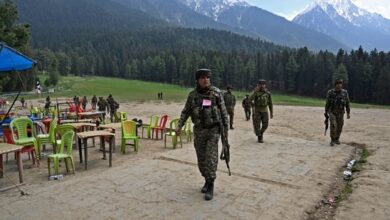“Not Even A Drop.”: How India Prepares To Contain Flow Of Indus Water To Pak
A crucial meeting took place at Home Minister Amit Shah's home, where the meeting was addressed by Jal Shakti Minister CR Patil and senior officers.

New Delhi:
Underscores the need to put on hold the Indus Waters Treaty, Union Jal Shakti Minister CR Patil has stated India will make sure no “drop of water” from Indus river goes to Pakistan.
Mr. Patil made this statement in a posting on Friday after a meeting at Home Minister Amit Shah’s residence, which was also followed by top officials.
“The Modi government’s historic move on the Indus Water Treaty is absolutely justified and in the interest of the country. We will make sure that not a single drop of water from the Indus River reaches Pakistan,” Mr Patil posted in Hindi on X.
India on Wednesday announced suspension of the Indus Waters Treaty of 1960 as part of a series of measures following the dastardly terror strike in Jammu and Kashmir’s Pahalgam where 25 tourists and one local were murdered. The Jal Shakti Ministry subsequently issued a letter to Syed Ali Murtuza, Secretary in the Ministry of Water Resources of Pakistan, informing the decision on Thursday.
“The commitment to fulfill a treaty in good faith is core to a treaty. But what we have witnessed instead is ongoing cross-border terrorism by Pakistan against the Indian Union Territory of Jammu and Kashmir,” the ministry stated in the letter.
Priority Areas
Senior officials stated that a comprehensive plan for India’s future course of action was deliberated during the meeting at Mr Shah’s house and it was agreed that the process of implementing the suspension of the treaty will start immediately.
“Several long-term plans are under consideration but the priority is a plan that can be a blueprint for the immediate and mid-term future,” an official stated.
Under the Indus Water Treaty, which was arranged by the World Bank, India has complete right over the three eastern rivers of the Indus system – Ravi, Beas and Sutlej – whereas Pakistan is granted access to approximately 135 million acre feet (MAF) of water from the three Western rivers – Indus, Jhelum and Chenab – which all flow downwards to the nation from India.
Of the choices available in the short term, the Centre is considering de-silting old dams on the Indus, Jhelum and Chenab and augmenting reservoir capacity, all of which will cut down the water flowing into Pakistan.
Pakistan has been protesting two Indian hydroelectric projects – Kishenganga on a tributary of the Jhelum and Ratle, currently under construction on a tributary of the Chenab. Suspension of the treaty will enable India to disregard Pakistan’s protests.
In the longer term, the construction of new dams and infrastructure on these rivers is also something which is being planned.
Legal Response
The officials added that a legal response is also being prepared in case there is any pressure from the World Bank or any other international organizations. Diplomatic efforts would also continue so that other nations understand why India took the decision.
“The government’s purpose is also that individuals in India experience no or minimal inconvenience due to this. Jal Shakti, Home and Ministry of External Affairs are dealing with it in a concerted manner,” a senior official told.
Pakistan has already stated that it is shaken by the suspension of the treaty. “Any attempt to halt or divert the flow of water due to Pakistan according to the Indus Waters Treaty. will be treated as an Act of War and responded with full force across the entire range of National Power,” Pakistan’s government stated in a statement on Thursday.






